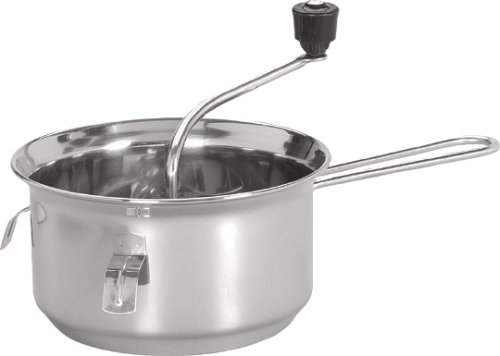
Looking for Bramble Varieties: Blackberries, Raspberries, Loganberries and Many More in 2025? Scroll down this page and follow the links. And if you bring home some fruit or vegetables and want to preserve, freeze, make jam, salsa or pickles, see this page for simple, reliable, illustrated preserving, freezing or bottling directions. There are plenty of other related resources, click on the resources dropdown above.
If you have questions or feedback, please let me know! There are affiliate links on this page. Read our disclosure policy to learn more.
Bramble Varieties: Blackberries, Raspberries, Loganberries and Many More
Bramble Varieties: Blackberries, Raspberries, Loganberries and Many More
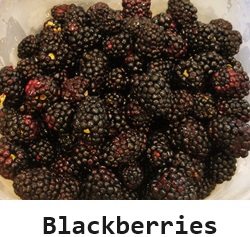 Bramble Varieties: Blackberries, Raspberries, Loganberries and Many More
Bramble Varieties: Blackberries, Raspberries, Loganberries and Many More
Brambles are usually thought of as blackberries, but the term includes a wide variety of wild and domestic blackberries and raspberries, including hybrids like Loganberries, Tayberries, Boysenberries, and raspberries. Brambles typically peak during July, but it can range from early June through October, especially since new everbearing varieties like the American PrimeArk blackberries have been commercialized.
Varieties of Brambleberries, Blackberries, Raspberries and Hybrids
There almost countless variants of brambles. Since the 1960's plant breeders and been crossing blackberries with raspberries, and then just to make things more confusing; crossing these new varieties back with other blackberries, raspberries and the new hybrids themselves! Almost all of them now come in a thorny and thornless variety. But the thorny varieties almost always have more intense flavour and produce larger yields. You'll have to ask Gregor Mendel why, but it is definitely true!
To order plants, click the links to see the plants sold on Amazon:
-
Blackberry - the original, often found in hedgerows along the side of the road. Tart with intense flavour, they make excellent
crumbles, jam and pair well with other berries, especially those with milder flavours, like strawberries. The semi-upright canes can be thorny
or thornless and many people swear that the flavour is
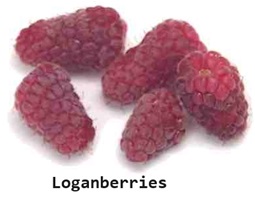 stronger in thorny varieties and in wild blackberries. The seeds can be removed to make a
seedless jam or jelly usiing a Foley food mill (or you can train monkeys
stronger in thorny varieties and in wild blackberries. The seeds can be removed to make a
seedless jam or jelly usiing a Foley food mill (or you can train monkeys
to do that, but they are very messy... ) There are many varieties of blackberries, see this page for complete descriptions.
-
Boysenberry - a boysenberry is a cross between raspberries, blackberries, the American dewberry and a loganberry. It's like a medium
sized blackberry with a red-deep maroon color and large seeds. It has a flavour similar to a Tayberry, just not as intense. Most varieties are
thornless vines which makes harvesting very easy.
- Cloudberry - an orange edible raspberry-like fruit they are popular in Sweden are native to Arctic and subarctic regions of the
northern hemisphere, such as Scandanavia, Russia, Canada
- Dewberry - Similar to blackberries, but have far fewer drupelets and are smaller. They're most popular in the U.S. Pacific northwest,
particularly Oregon.
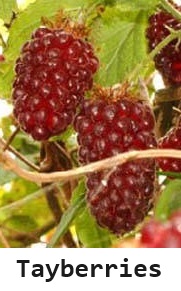
-
Loganberry - a blackberry and
red raspberry cross, it is purple almost black when ripe. Only the Tayberry is more flavorful. The Loganberry tastes like a mix of blackberries, raspberries and
strawberries. Get
thornless Loganberry plants here.
- Marionberry - Rare in the UK, it is mainly grown in Oregon, but it is like a larger and sweeter blackberry. They have an excellent blackberry
flavour!
- Olallieberry - Rare in the UK, it is mainly grown in California. They are almost as sweet and plump as a Marionberry, just a bit smaller.
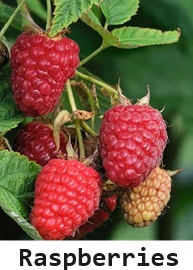
-
Raspberry - Raspberries come in many colours, most commonly: red, black, yellow orange/gold and purple. Less tart than blackberries,
with seeds half as big. They are in the bramble family, the genus Rubus of the rose family, The big difference between raspberries and
blackberries that the fruit pulls off of the the torus (the center receptacle or stem of the berry) . The torus stays with blackberries.
but on a raspberry, the torus remains on the plant, leaving a hollow core in the raspberry fruit. A typical individual raspberry weighs 3–5 g
(0.11–0.18 oz) and is made up of around 100 drupelets,[8] each of which consists of a juicy pulp and a single central seed. As for varieties, I
can easily tell you that
Autumn Bliss is the best variety I have grown. It it is an everbearer that produces large berries, large crops and has great flavour.
- Salmonberry - Mostly grown in the U.S. Pacific northwest, it is a small round, flavourful orange berry, very tart , thorny vines that grown on the
ground.
-
Tayberry - Developed in Tayside, Scotland in 1979 and named after the river Tay, by crossing blackberries with raspberries, this
reddish-purple almost black when fully ripe berry has a n intense, complex flavour,, sweet and tasty! The tayberry is is sweeter and much
larger, with a more complex flavor than that of loganberries. It almost tastes like a mix of blackberries, raspberries and strawberries.
Tayberries make amazing jam!
- Thimbleberry - Rubus parviflorus, or redcaps are found in northern North America. It looks much like a raspberry but the fruits are more soft so it
does not pack or ship well, which means it is gather locally and not grown commercially. You are unlikely to see these in the UK
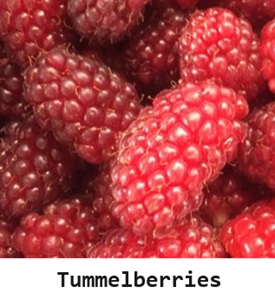 Tummelberries - Rubus trilobus.
The Tummelberry is a fairly new hybrid, a blackberry flavored raspberry developed by the Scottish Crop Research Institute. It looks more like
raspberries, but tastes like blackberries with raspberry. Bright red to purplish at full ripeness.
Tummelberries - Rubus trilobus.
The Tummelberry is a fairly new hybrid, a blackberry flavored raspberry developed by the Scottish Crop Research Institute. It looks more like
raspberries, but tastes like blackberries with raspberry. Bright red to purplish at full ripeness.
- Silvanberry - This Marionberry - boysenberry hybrid is large, dark red to black and tasty.
- Chuckleberries - While you might get a laugh out of the chuckleberry, the chuckleberry is a hybrid mix of a redcurrant, blackcurrant
and a gooseberry. It is reputed to have a strong, aromatic flavour..
- Wineberry - (Rubus phoenicolasius) They look a bit like a small, round, red blackberry or a salmonberry, but it is from Asia and is related to
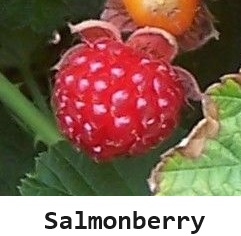 raspberries (Rubus subgenus Idaeobatus) It produces flowers on short, very bristly racemes (mini-thorns on the stems). The fruit is edible and tasty, tart
and sweet when ripe, like a raspberry. Wineberries are used similarly to raspberries to make jams, pies and crumbles.
raspberries (Rubus subgenus Idaeobatus) It produces flowers on short, very bristly racemes (mini-thorns on the stems). The fruit is edible and tasty, tart
and sweet when ripe, like a raspberry. Wineberries are used similarly to raspberries to make jams, pies and crumbles.
Making Seedless Jams and Jellies with Brambles
If you want to make seedless jams, jellies, crumbies, smoothers, etc, you'll definitely want a Foley Food Mill. It is a fast and easy way to separate the berry pulp from the seeds.
Blackberry Recipes, Freezing and Jam directions
- How to make Blackberry jam - It is VERY easy - especially with our free Blackberry jam directions - very easy!
- How to make Blackberry jelly
- How to freeze berries
- Blackberry syrup, make and can it!
- Seedless blackberry pie!
- Blackberry Festivals: Where, When and More to Find an Blackberry Festival Near You this year:
Frequently Asked Questions and Answers About Blackberries
- How to freeze blackberries?
Just rinse them in cold water. I use a large bowl filled with water, pour the berries in, and gently stir them with my fingers to dislodge any dirt or bugs. Then using my fingers like a sieve, I scoop the blackberries out of the water, and put them in a drainer to let the water drain off. Then I just pour the berries into a ziploc bags or vacuum sealer bags and pop them in the freezer. After they are frozen, I remove as much air from the bag as possible and seal the bags.
